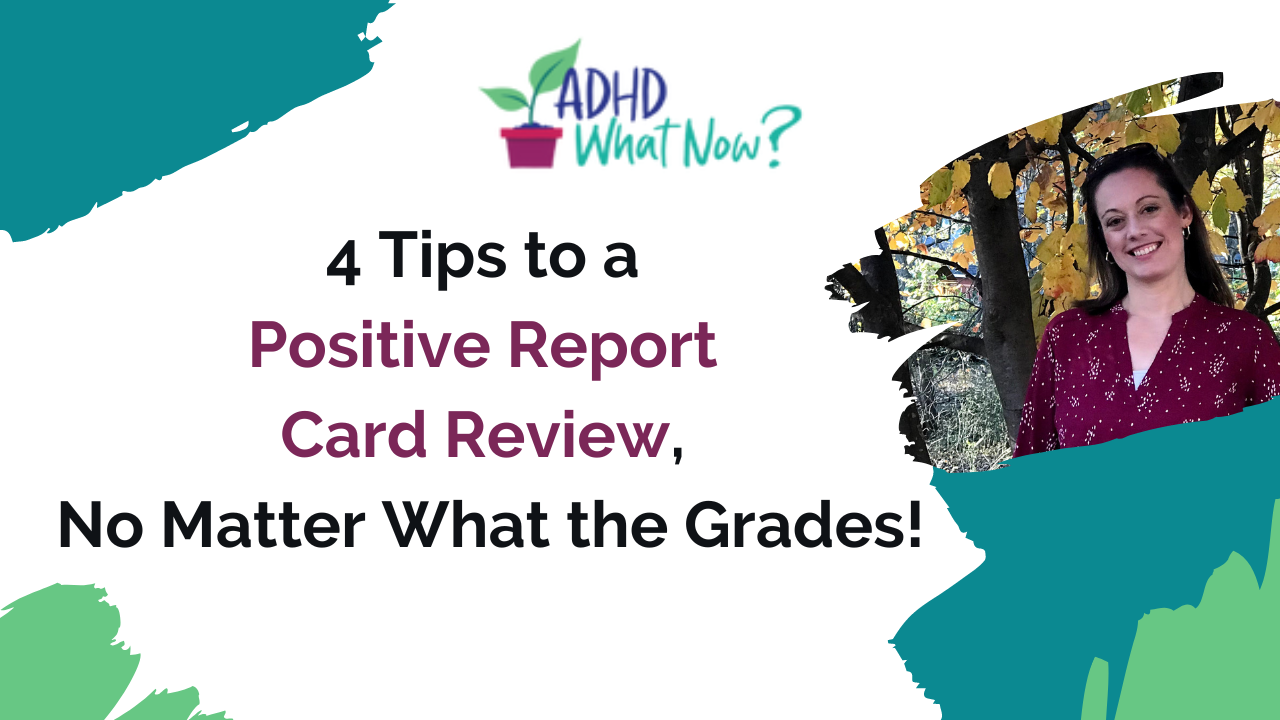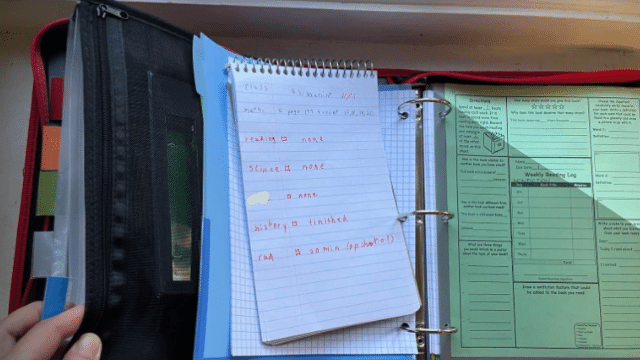4 Tips to a Positive Report Card Review, No Matter What the Grades
Nov 18, 2022
Have you ever felt torn?
- Do I celebrate a D?
- Do I push for A’s and B’s?
- How do I motivate my kiddo to get better grades?
- How do we have a conversation around report cards?
In our family, I was really curious about this year's first report card. When the notification that grades were posted came through, I abandoned the regular bedtime activities and logged on. (Would you call that impulsive? ;) haha)
My kiddo happened to come by as I was reviewing the grades, and it turned into a really excellent conversation. I didn't have a plan, and it turned out beautifully because it was all about growth over time. I'm not sure it would have been so productive if I haven't been immersing myself in ADHD coaching and executive functioning professional development training.
It worked so well we'll make a tradition of a forward-focused report card review
and I wanted to share with you tips that helped.
Would it be amazing if the report card review were a positive experience for you regardless of the grades?
This can be a high-emotion and potentially high-tension conversation, as you want your kiddo to do well.
Yet, if we shift the focus to learning about what worked well or didn't over the past few weeks and viewed them as an opportunity to help us choose our actions going forward, how do you think that would work to help your kiddo progress?
So, how do you use a report card review to propel progress in the next quarter...
4 Tips to a Positive Report Card Review, No Matter What the Grades:
1 - Make your goals long-range
Would you agree the ultimate goal is that this kiddo is able to launch into the world and independently live a life of well-being? As such, the goal is less for this immediate report card and more for long-term growth.
So, let’s frame the conversation of report cards with a growth mindset and the context of “Hey, kiddo, how are you feeling about your growth over time?” Within this context, As, Bs, Cs, and Ds can be celebrated. Plus, you’ll be reinforcing a growth mindset, which is key to resilience. You can also complement effort - as well-known ADHD expert Dr. Sharon Saline says - "complement efforting." I see this as a keep to keep motivation going - after all, when no one notices the extra effort I put into cooking a nice meal, I'm much less likely to do it again.
2 - Remember kids do well IF they can
Jack struggled for years in school. As a high school student, they found that his visual system had convergency insufficiency, meaning that his eyes were not able to focus well, and this was the root cause of many ADHD symptoms. With some exercises to strengthen the visual system, Jack was better able to focus, symptoms that looked like ADHD were reduced, school work felt easier, and grades improved.
Many neurodivergent kids experience similar things that make school hard for them. Jack would have done well if he could, but he struggled without specialized support for his visual system.
Perhaps your kiddo has something similar that has yet to be identified? Go here if you’d like a list of coexisting conditions.
It is true that kids do well IF they can. Warmth and belief in this fundamental principle are so important to ensuring long-term motivation. Motivate by praising their efforts and celebrating their progress, no matter how small.
3 - Have a report card meeting
It doesn’t have to be formal, but it is important to make the time and the space safe.
Here are some tips to make this a safe space.
- Book time so that you’re not feeling pressure to be doing something else and feeling stressed already.
- Create a positive tradition to go along with it - share a bowl of popcorn, have a cup of hot cocoa or give a warm hug at the end.
- Have the conversation alone - no siblings around.
- Help your kiddo do a self-review (see Tip 4)
- End with a positive comment or celebration about something that you noticed they did that reflected well on the report card (it's all about progress).
4 - Help your kiddo do a self-review
One key to transferring independence is that the kiddo is accurately able to see where they are today and be aware of what went into the grades. Many kids with neurodiversity need additional support to learn how to prioritize which assignments are worth the most point, for example. Here are some questions that you can use to help your kiddo do a self-review:
- “Did you notice…”
- “I wonder how that grade was calculated…”
- "How much of the grade was homework?” “Oh look, that test was 25% of the grade. That’s a lot. Do you think it will be that much next quarter too?”
- "What will you do to prepare for that project that is 25% of the grade next quarter?”
When I did this with my kiddo, we noticed that homework was a significant percentage of the grade.
Thankfully, we had been working on forming a habit of recording the homework. Here's a pic of the folder and homework recording system we developed together.

A few questions from me with a neutral tone of voice helped him draw the connection between using his system and his grades.
Taking it a step further, I took the 30+ hours of executive function training I've taken and translated it into usable routines and tools for the home that support skills that get the homework turned in AND build life skills.
I put it together into a Homework Helpers Training and Printables and bundled it with the Executive Function Toolbox.
Get your first printable to help prioritize what is done each night free here.
You can check out the bundle here.
Because whether the grades are A's or D's, the life skills of managing time or prioritizing what gets your attention are essential to adult living, and you can be the person who helps your kiddo do that well!